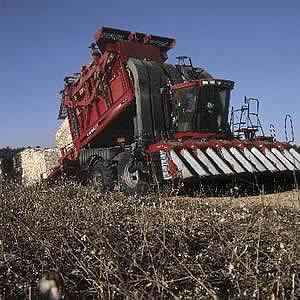 |
|||||||||
|
|||||||||||||||||||
It has been a year since Case IH introduced the Case IH Module Express™ 625, the only commercial cotton picker to build modules while harvesting. Growers who used this machine for the 2007 cotton harvest report that it was a sound investment.
"The Module Express allows one man to do the work of three," says Dan Kornegay, who grows 2,500 acres of cotton in Faison, N.C. "It only takes one person to pick the cotton and build the modules with the Module Express, reducing equipment and labor costs. I'm saving about $1,000 per day by running three less tractors, hiring three less operators and eliminating the maintenance costs of extra equipment. I'm easily going to save $50,000 per year." Steve Daley of Thatcher, Ariz., found the Module Express to be the solution to high fuel prices and labor shortages. "No boll buggies or module builders are needed with this system," says Daley. "We were able to eliminate seven pieces of equipment." Daley adds that finding seasonal help for cotton harvest has been challenging. "Labor costs have gone through the roof," he says. "This system is so much more labor efficient. I only need three people for harvest instead of seven with the old system." Edward Fiveash of Donalsonville, Ga., agrees that finding dependable seasonal help is difficult. "My son was able to pick cotton by himself with the Module Express. We needed five less people to harvest. It was a tremendous labor saver and the machine does an excellent job of picking." No modifications needed The Case IH Module Express does not require modifications to existing equipment. The Case IH half modules are 8-foot by 8-foot by 16-foot, which is the same height and width of a standard module but half the length. A producer uses smaller reusable tarps to cover the modules. One person can often handle these easy-to-use tarps versus two with larger traditional modules. No alterations are required to the ginning process. This is the benefit that sold David Harris of Senath, Mo., who runs 4,600 acres of cotton and is also part owner of a gin. "As a ginner, I like the fact that the Module Express doesn't require any special equipment. I looked at the John Deere system, but the gin would have to buy $250,000 worth of equipment to unwrap the modules and get the plastic off. There's also the issue of plastic disposal." Harvest stays on schedule The Module Express picks cotton at a slightly faster pace than a traditional 6-row picker and modules form simultaneously. "It only takes a little more than a minute to dump a module when full," says Fiveash. "We'd have had to wait four to five minutes for a boll buggy with the old system." Justin Layton of Thatcher, Ariz., notes that the Module Express allowed him to free up equipment for fall tillage work. "Before the Module Express, we wouldn't start plowing until we were done picking," says Layton. "We're now working ground right behind the picker. We were able to get winter wheats planted in October versus January with the old system." Harvesting was a bottleneck area for Mike Sturdivant of Glendora, Miss. "It used to require all my labor and equipment," he says. "Now I'm able to use that labor for fall tillage work." Less maintenance Layton adds that the maintenance for the Module Express is also much simpler. "Everything is on board," he explains. "We used to spend two hours per day cleaning and maintaining equipment. It now takes less than one hour." Daryl Pasket of Anderson, Texas, custom harvests approximately 16,000 acres of cotton. He used a Module Express as one of the cotton pickers in his fleet this year and plans to move to the Module Express to reduce maintenance costs, labor needs and freight costs. "I will have 14 less pieces of equipment to maintain and will need less employees. That means less hotel bills, less liability and less insurance. I'll also be able to truck equipment in one day and be ready to go the next. I'll be able to eliminate about eight loads of equipment every time I move to a new area." Bill Walker of Somerville, Tenn., points out that the Module Express cuts down on maintenance of other equipment, as well. "This machine eliminates the need for boll buggies, module builders and the associated tractors. Anytime you get rid of equipment, you eliminate the time to maintain that equipment. That's less equipment to break and less downtime." David Harris describes the 2007 harvest season as "quiet." "We saved on diesel fuel and didn't have breakdowns," says the Senath, Mo., grower. "With module builders, boll buggies and tractors, we always had downtime. Harvest was actually pretty dull this year. The Module Express was in the field and one person was tarping modules. This was the most peaceful harvest I can remember." Case IH is a global leader in agricultural equipment, committed to collaborating with its customers to develop the most powerful, productive, reliable equipment - for those who demand more. With headquarters in the United States, Case IH has a network of dealers and distributors that operates in over 160 countries. Case IH provides agricultural equipment systems, flexible financial service offerings and parts and service support for professional farmers and commercial operators through a dedicated network of professional dealers and distributors. Productivity enhancing products include tractors; combines and harvesters; hay and forage equipment; tillage tools; planting and seeding systems; sprayers and applicators; and site-specific farming tools.
|
|||||||||||||||||||

|
|||||||||||||||||||
| home | agri-services | pedigree pen | news | dairy | beef | machinery BPS | property | organisations | site map |
|||||||||||||||||||


